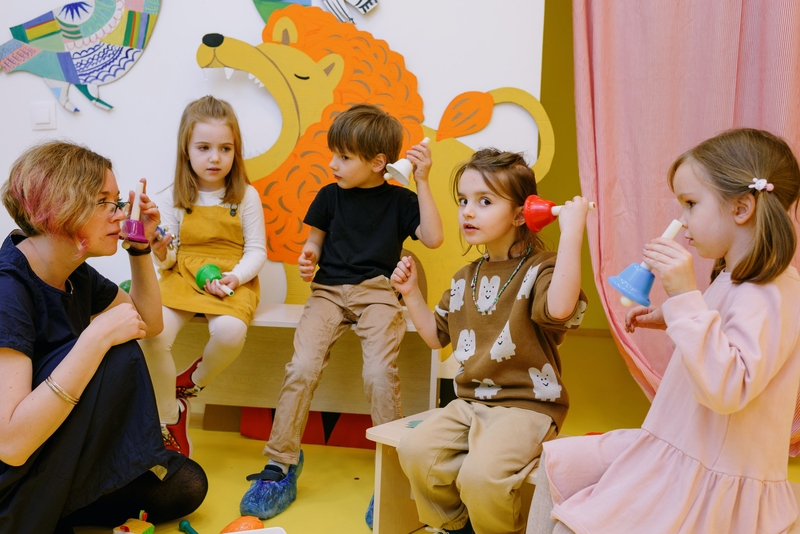Exploring the Essential Duties and Responsibilities of a Primary School Teacher: A Comprehensive Job Description
"Teaching is a very noble profession that shapes the character, caliber, and future of an individual. If the people remember me as a good teacher, that will be the biggest honor for me." - A. P. J. Abdul Kalam
Brief Insight
Primary school teachers are responsible for planning and delivering lessons to students aged 5-11, covering a range of subjects such as English, math, science, and social studies. They also assess students' progress, provide feedback to parents, and create a safe and positive learning environment for their students.

PHOTO: https://www.pexels.com/uk-ua/@katerina-holmes/
Roles and Responsibilities of a Primary School Teacher: A Comprehensive Overview
A primary school teacher is a professional educator who is responsible for teaching students at the elementary school level, typically aged between 5 to 11 years old. Primary school teachers are trained to educate children in a wide range of subjects, including math, science, English, social studies, and more. They provide foundational knowledge to students that will help them succeed throughout their academic careers and in life.
In addition to teaching, primary school teachers have a variety of responsibilities. They create lesson plans, grade assignments, and assessments, and monitor student progress. They also provide guidance and support to their students, helping them develop social skills, critical thinking abilities, and a love of learning. Primary school teachers must create and maintain a positive classroom environment that is conducive to learning, while also addressing the individual needs of each student.
To become a primary school teacher, one must obtain a bachelor's degree in education or a related field and earn a teaching license or certification. Many primary school teachers also pursue continuing education to stay current with teaching methodologies and advancements in their subject areas.
Primary school teachers play a vital role in shaping the education and development of young students, and their work has a significant impact on their students' lives and future success.
Interesting Facts
In the United States, approximately 3.2 million individuals are employed as primary school teachers. According to a 2021 survey, primary school teachers spend an average of 9 hours and 45 minutes per day on work-related activities, which is longer than the average workday for many other professions.
What Does a Typical Day Look Like for a Primary School Teacher?
Primary school teachers have a varied and dynamic workday. Here's what a typical day might look like:
- Preparing for the Day: A primary school teacher typically arrives early to school to prepare for the day ahead. This includes reviewing lesson plans, gathering materials, and setting up the classroom.
- Teaching Classes: The bulk of a primary school teacher's day is spent, teaching classes. This may involve leading whole-class lessons, working with small groups, or providing individual support to students who need extra help.
- Planning and Grading: In between classes, primary school teachers use their planning periods to grade assignments, prepare lesson plans, and communicate with parents and other teachers.
- Collaborating with Colleagues: Primary school teachers often collaborate with other teachers and staff members throughout the day. This may involve team meetings, collaborating on lesson plans or activities, or discussing individual students' needs.
- Supervising Recess and Lunch: Primary school teachers also have a supervisory role during recess and lunch periods, ensuring that students are safe and engaged in appropriate activities.
- Supporting Extracurricular Activities: Many primary school teachers also support extracurricular activities such as sports teams, music groups, or drama clubs, and may attend after-school events or meetings.
- Professional Development: Finally, primary school teachers may also participate in ongoing professional development activities, such as workshops or training sessions, to stay up-to-date on the latest teaching methods and best practices.
Overall, the day-to-day life of a primary school teacher is varied and rewarding, with many opportunities to make a positive impact on students' lives.
Last Trends
Use of technology: With the increasing availability of technology in classrooms, primary school teachers are incorporating various forms of technology such as educational software, online resources, and interactive whiteboards to enhance teaching and learning.
Key Requirements for the Job of Primary School Teacher
To become a primary school teacher, there are several key requirements that must be met. These include:
- Education: Primary school teachers are typically required to have a bachelor's degree in education or a related field. Some states may also require a teaching certification or license.
- Experience: Many schools prefer primary school teachers who have prior experience working with children, such as through tutoring or volunteer work.
- Patience and Flexibility: Primary school teachers need to be patient and flexible, as they work with children who have different learning styles and abilities.
- Communication Skills: Primary school teachers must be able to communicate effectively with students, parents, and other teachers and staff members.
- Organization: Primary school teachers need to be well-organized, as they must manage multiple tasks and activities throughout the day.
- Creativity: Primary school teachers should be creative and able to develop engaging lesson plans and activities that capture students' interests.
- Passion for Teaching: Above all, primary school teachers should have a passion for teaching and a desire to help students learn and grow.
Meeting these key requirements can help aspiring primary school teachers succeed in this rewarding and challenging field.

PHOTO: https://www.pexels.com/uk-ua/@julia-m-cameron/
Primary School Teachers: Going Beyond the Classroom Duties
Primary school teachers have a wide range of duties that they must perform on a daily basis. These duties include:
- Lesson Planning: Primary school teachers are responsible for creating lesson plans that align with state standards and meet the needs of their students.
- Teaching Classes: Primary school teachers teach a variety of subjects, including math, science, social studies, and language arts, to students in grades K-5.
- Assessing Student Progress: Primary school teachers assess student progress through various methods, such as quizzes, tests, and projects, and use this information to adjust their lesson plans as needed.
- Providing Individual Support: Primary school teachers work with individual students who may be struggling with a particular concept or need extra help.
- Communicating with Parents: Primary school teachers communicate with parents regularly, providing updates on students' progress and discussing any concerns.
- Collaborating with Other Teachers and Staff Members: Primary school teachers collaborate with other teachers and staff members to ensure that students receive a well-rounded education.
- Managing Classroom Behavior: Primary school teachers are responsible for managing classroom behavior and ensuring that students are engaged and on-task.
- Providing Extra-Curricular Support: Primary school teachers often support extracurricular activities such as sports teams, music groups, or drama clubs.
- Staying Up-to-Date with Education Trends: Primary school teachers stay up-to-date with the latest education trends and best practices through professional development opportunities.
Overall, primary school teachers have a diverse and challenging set of duties that require a combination of teaching skills, organizational abilities, and strong communication skills.
Interesting Facts
Primary school teachers often spend their own money on classroom supplies and materials. In fact, a 2018 survey found that on average, teachers spent $479 of their own money on school supplies during the previous school year.
In many countries, primary school teachers are predominantly female. For example, in the United States, approximately 76% of primary school teachers are women.
Additional Responsibilities of a Primary School Teacher
In addition to their core duties, primary school teachers also have additional responsibilities that contribute to their effectiveness as educators. These responsibilities may include:
- Parent-Teacher Conferences: Primary school teachers typically hold parent-teacher conferences to discuss student progress, answer questions, and address any concerns that parents may have.
- Special Education: Primary school teachers may work with special education students, providing individualized support and accommodations to help them succeed.
- Classroom Management: Primary school teachers must effectively manage their classrooms to ensure that students are safe and engaged in learning.
- Curriculum Development: Primary school teachers may be involved in developing or revising curriculum materials to ensure that they are aligned with state standards and meet the needs of their students.
- Professional Development: Primary school teachers engage in ongoing professional development opportunities to stay up-to-date with the latest trends and best practices in education.
- Student Assessment and Reporting: Primary school teachers regularly assess student progress and report on their achievements to parents, administrators, and other stakeholders.
- Technology Integration: Primary school teachers are increasingly responsible for integrating technology into their classrooms to enhance learning and engage students.
- Community Engagement: Primary school teachers may engage with the broader community through outreach efforts, volunteer work, and involvement in school or community events.
These additional responsibilities require primary school teachers to be highly skilled in areas such as communication, collaboration, and problem-solving. By effectively balancing these responsibilities with their core teaching duties, primary school teachers can help ensure that their students receive the best possible education.
Amazing Careers
Dr. Jill Biden - First Lady of the United States, Dr. Biden is a lifelong educator and a former primary school teacher. She has worked in several schools and has been an advocate for education throughout her career.
Mastering the Skills: Key Competencies for a Successful Career as a Primary School Teacher
Becoming a primary school teacher is a fulfilling and rewarding career, but it requires a diverse set of skills to be successful. While there are some hard skills, such as curriculum development and lesson planning, that are crucial to the teaching, soft skills like communication and empathy are just as important. Primary school teachers must be able to adapt to the needs of their students, effectively manage a classroom, and create a positive learning environment. In this article, we'll explore the essential skills required to become a primary school teacher and how they can help educators shape young minds and inspire a love of learning.
Hard Skills for Becoming a Primary School Teacher
Becoming a primary school teacher requires a combination of soft and hard skills. While soft skills such as communication and empathy are crucial, hard skills are also necessary to be an effective educator. Here are some of the essential hard skills needed to become a primary school teacher:
- Curriculum Development: Primary school teachers must have a solid understanding of curriculum development to ensure that their lessons are aligned with state standards and appropriate for their students' age and learning needs.
- Lesson Planning: Planning and designing lessons that are engaging and meet learning objectives is a crucial skill for a primary school teacher.
- Classroom Management: The ability to effectively manage a classroom and ensure that students are engaged and on-task is essential.
- Assessment and Evaluation: Primary school teachers must be able to develop and administer assessments that accurately measure student learning and progress.
- Instructional Technology: Integrating technology into the classroom is becoming increasingly important, and primary school teachers must be skilled in using instructional technology to enhance learning.
- Differentiation: Teachers must have the ability to differentiate instruction to meet the unique needs of all students, including those with learning disabilities or language barriers.
- Literacy and Numeracy Skills: Primary school teachers must have a strong grasp of literacy and numeracy concepts to effectively teach foundational skills to their students.
- Classroom Environment: Creating a positive, welcoming, and safe learning environment for students is a critical hard skill for primary school teachers.
- Data Analysis: Analyzing student data to inform instruction and identify areas where students may need additional support is a critical hard skill for primary school teachers.
- Special Education: Primary school teachers must be able to work effectively with students who have special needs and be familiar with special education laws and regulations.
To be an effective primary school teacher, a combination of soft and hard skills is needed. These hard skills help teachers to develop and deliver high-quality lessons that meet the needs of all their students.

PHOTO: https://www.pexels.com/uk-ua/@yankrukov/
Soft Skills for Becoming a Primary School Teacher
Being a primary school teacher is more than just delivering lessons and assigning homework. Teachers play a critical role in shaping the lives of their students, and it requires a diverse set of skills to be successful in this career. While hard skills like lesson planning and curriculum development are crucial, soft skills such as communication and empathy are equally important. In this article, we'll explore the essential soft skills needed to become a primary school teacher.
- Communication: Effective communication is essential for teachers to engage with students, parents, and colleagues. Being able to explain concepts and ideas clearly, listen actively, and respond appropriately is vital.
- Empathy: Primary school teachers must be able to empathize with their students to understand their unique needs and perspectives. This skill helps to create a safe and welcoming classroom environment where students can thrive.
- Patience: Teachers must have the patience to work with students of varying abilities, behaviors, and needs. This skill is vital for maintaining a positive and productive classroom environment.
- Creativity: Primary school teachers must be creative in their approach to teaching to keep students engaged and interested. Finding innovative ways to present information and incorporating games and activities into lessons can help make learning fun.
- Flexibility: Teachers must be flexible and able to adapt to the needs of their students. This skill is particularly important when working with students who have special needs or face language barriers.
- Time Management: Effective time management is essential for teachers to plan and deliver high-quality lessons while also managing administrative tasks like grading and preparing materials.
- Collaboration: Primary school teachers must be able to collaborate with other teachers, parents, and administrators to ensure that students receive the support they need to succeed.
Becoming a primary school teacher requires a combination of hard and soft skills. While hard skills are essential for developing and delivering high-quality lessons, soft skills are critical for creating a positive and engaging learning environment for students. The essential soft skills outlined in this article can help aspiring primary school teachers excel in this rewarding and fulfilling career.
Interesting Facts
The job outlook for primary school teachers is positive, with an estimated 4% job growth rate projected over the next decade.
Primary school teachers often work long hours, including weekends and evenings, to prepare lesson plans, grade assignments, and attend school events.
Essential Character Traits for Primary School Teachers
Being a primary school teacher is a demanding and rewarding profession that requires a combination of hard and soft skills. However, certain character traits are crucial for teachers to be effective and successful in their roles. In this article, we will explore the essential character traits that are necessary for primary school teachers.
- Adaptability: Primary school teachers must be adaptable and flexible to be able to accommodate the different needs of their students. Teachers must be able to modify their teaching approach to ensure that students receive a high-quality education.
- Dedication: Dedication is a crucial trait for primary school teachers. Teachers must be dedicated to their profession and committed to ensuring that their students receive the best education possible.
- Positivity: A positive attitude is essential for primary school teachers. Teachers who demonstrate a positive attitude can create a positive classroom environment and encourage students to succeed.
Primary school teachers require a diverse set of skills and character traits to be successful in their roles. While hard skills like lesson planning and curriculum development are important, soft skills and character traits such as patience, adaptability, empathy, creativity, dedication, communication, and positivity are equally crucial for primary school teachers to excel in their profession.
Last Trends
Emphasis on social-emotional learning: Schools are increasingly recognizing the importance of social-emotional learning (SEL) in a child's development. Primary school teachers are incorporating SEL activities, such as mindfulness exercises and conflict resolution techniques, into their classroom activities.
Becoming a Primary School Teacher: Education Requirements and Pathways
Becoming a primary school teacher is a career path that requires a specific set of skills, qualifications, and personal characteristics. While anyone can aspire to become a primary school teacher, certain requirements must be met to pursue this profession. In this article, we will explore who can become a primary school teacher, the necessary qualifications, and the requirements needed to be successful in this career.
- Educational Requirements: To become a primary school teacher, you need to have a Bachelor's degree in education, early childhood education, or a related field. Additionally, you will need to obtain a teaching certificate or license, which requires completing a teacher preparation program and passing state exams.
- Personal Characteristics: Primary school teachers should have excellent communication skills, and be patient, adaptable, empathetic, creative, and dedicated. These personal characteristics are crucial for engaging students and creating a positive learning environment.
- Experience: Some primary school teacher positions may require prior teaching experience, either in a formal or informal setting. Experience working with children, such as volunteering at a local school or mentoring, can also be helpful.
- Background Checks: All teachers must pass a background check, which includes a criminal history check and fingerprinting. This is to ensure the safety of students in the school environment.
- Professional Development: Primary school teachers must also engage in professional development opportunities to continue learning and improving their skills. This may include attending workshops, and conferences, or pursuing advanced degrees.
Becoming a primary school teacher requires a combination of educational requirements, personal characteristics, experience, and professional development. While anyone can aspire to become a primary school teacher, meeting the necessary qualifications and possessing the essential skills and characteristics is crucial for success in this career.

PHOTO: https://www.pexels.com/uk-ua/@max-fischer/
Education Requirements for Primary School Teachers: How to Prepare for a Career in Education
To become a primary school teacher, a specific educational path must be followed. Primary school teachers need to have at least a Bachelor's degree in education or a related field, and in some cases, a master's degree may be required. In this article, we will explore the education requirements needed to become a primary school teacher, including the coursework, fieldwork, and certifications needed to succeed in this career.
- Bachelor's Degree in Education: The first step towards becoming a primary school teacher is to obtain a Bachelor's degree in education. This degree program focuses on the theories and principles of teaching, curriculum development, and child development. It also includes courses in classroom management, assessment, and educational psychology.
- Fieldwork and Student Teaching: In addition to coursework, education programs require fieldwork and student teaching to gain practical experience in the classroom. During this time, aspiring teachers work with experienced teachers to plan and teach lessons, manage the classroom, and interact with students.
- State Certification: After completing a Bachelor's degree program, aspiring teachers must obtain state certification to become licensed teachers. The requirements for certification vary by state but usually involve passing state exams and completing a teacher preparation program.
- Master's Degree: Some states and school districts may require primary school teachers to have a Master's degree in education or a related field. A Master's degree program may provide additional coursework in areas such as special education, curriculum development, and research methods.
- Continuing Education: Once certified, primary school teachers must engage in continuing education to maintain their certification and stay up-to-date with the latest teaching practices and educational technologies.
To become a primary school teacher, a Bachelor's degree in education or a related field, fieldwork and student teaching, and state certification are necessary. Some states and school districts may also require a Master's degree. Continuing education is also essential to maintain certification and improve teaching skills. By meeting these educational requirements, aspiring primary school teachers can prepare for a rewarding career in education.
Interesting Facts
In addition to traditional classroom teaching, primary school teachers may also work as coaches, mentors, and advisors to students.
Primary school teachers play a crucial role in the development of young children, and their impact can be long-lasting and significant in a child's life.
Knowledge for Primary School Teachers: What You Need to Know to Succeed in Education
To be an effective primary school teacher, you must possess a range of knowledge and skills beyond the foundational coursework taught in education programs. Primary school teachers must have a strong understanding of the subject matter they teach, as well as the educational theories and practices that guide instruction. Additionally, primary school teachers must have knowledge of child development, learning styles, and classroom management techniques. In this article, we will explore the essential knowledge that primary school teachers need to succeed in education.
- Content Knowledge: Primary school teachers must have a strong understanding of the content they teach, including language arts, mathematics, science, social studies, and the arts. Teachers must also have a deep knowledge of the curriculum and standards for each subject area.
- Pedagogical Knowledge: Pedagogical knowledge refers to the understanding of educational theories and practices that guide instruction. Primary school teachers must have a strong understanding of how students learn, different learning styles, and how to differentiate instruction to meet the needs of all students.
- Child Development: Understanding child development is critical to being an effective primary school teacher. Teachers must understand how children develop physically, socially, emotionally, and cognitively, and use this knowledge to inform their instruction.
- Classroom Management: Classroom management skills are essential for primary school teachers to maintain a safe and productive learning environment. Teachers must know how to establish rules and procedures, manage student behavior, and create a positive classroom culture.
- Assessment: Primary school teachers must have knowledge of various assessment techniques, including formative and summative assessments. Teachers must be able to use assessment data to inform instruction and adjust their teaching to meet the needs of individual students.
Primary school teachers need a range of knowledge and skills to be effective educators. Essential knowledge includes subject matter expertise, pedagogical knowledge, child development, classroom management, and assessment techniques. By possessing these essential skills, primary school teachers can create a safe and productive learning environment that fosters student success.
Amazing Careers
Marva Collins - An American educator and former primary school teacher, Marva Collins founded the Westside Preparatory School in Chicago, which served underprivileged students and gained national attention for its high academic standards.
Additional Courses to Consider When Becoming a Primary School Teacher
While a degree in education provides the foundational knowledge and skills needed to become a primary school teacher, additional coursework can further enhance your skills and make you a more competitive candidate for job opportunities. These courses can provide you with specialized knowledge and skills that can be applied in the classroom setting. In this article, we will explore some of the additional courses that aspiring primary school teachers can consider enhancing their skills and knowledge.
- Special Education: A course in special education can provide you with the knowledge and skills needed to work with students who have disabilities or special needs. This can include instruction on the laws and regulations governing special education, as well as strategies for accommodating students' needs and providing individualized instruction.
- Technology Integration: Technology is becoming increasingly important in education, and a course in technology integration can provide you with the skills needed to effectively incorporate technology into your teaching. This can include instruction on using educational software and apps, integrating multimedia resources, and designing technology-enhanced lessons.
- Multicultural Education: In a diverse classroom setting, understanding and respecting different cultures is essential. A course in multicultural education can provide you with the knowledge and skills needed to create an inclusive and culturally responsive classroom environment.
- Literacy Instruction: Strong literacy skills are essential for success in all subject areas. A course in literacy instruction can provide you with the skills needed to effectively teach reading, writing, and language arts in the primary grades.
- Classroom Management: Classroom management is a critical skill for primary school teachers, and additional coursework in this area can provide you with strategies for managing student behavior, establishing a positive classroom culture, and addressing challenging behavior.
While a degree in education provides the foundational knowledge and skills needed to become a primary school teacher, additional coursework can further enhance your skills and make you a more competitive candidate in the job market. Courses in special education, technology integration, multicultural education, literacy instruction, and classroom management are just a few of the options available to aspiring primary school teachers. By taking additional courses, you can become a more effective and successful educator.

PHOTO: https://www.pexels.com/uk-ua/@kseniachernaya/
Licensing and Certification Requirements for Aspiring Primary School Teachers in the United States
In the United States, the requirements for licensing and certification as a Primary School Teacher vary by state. However, most states require candidates to hold a bachelor's degree in education or a related field, complete a teacher preparation program, pass state-administered exams and complete a background check. Some states may also require additional coursework or professional development. Additionally, some states offer alternative routes to certification for individuals who hold a bachelor's degree in a non-education field. It's important for aspiring Primary School Teachers in the United States to research the requirements in their specific state and ensure they meet all necessary criteria.
Interesting Facts
Primary school teachers often use creative and interactive teaching methods, such as games, role-playing, and storytelling, to engage their students and make learning fun.
Primary school teachers are trained to recognize and address a range of learning and developmental challenges that their students may face, including learning disabilities, ADHD, and behavioral issues.
The Timeline to Becoming a Primary School Teacher in the United States
Becoming a Primary School Teacher in the United States typically takes at least four years of undergraduate education followed by a teacher preparation program. Most aspiring teachers pursue a bachelor's degree in education or a related field, which takes about four years to complete. After earning their degree, candidates must complete a teacher preparation program, which typically lasts one to two years. In some cases, alternative pathways to certification may be available that can take less time, such as for candidates who have a degree in a non-education field. Overall, it can take between five and six years to become a licensed and certified Primary School Teacher in the United States.
Last Trends
Blended learning: With the onset of the pandemic, primary school teachers have been implementing blended learning, which combines traditional classroom teaching with online and digital resources.
Exploring the Working Environment of a Primary School Teacher
In addition to the primary responsibilities of teaching and classroom management, Primary School Teachers must also create a safe and supportive learning environment for their students. This includes setting clear expectations for behavior and enforcing classroom rules, as well as providing emotional support and guidance for students who may be struggling with personal issues or challenges. Teachers must also be able to effectively communicate with parents and guardians, keeping them informed of their child's progress and working collaboratively with them to address any concerns.
Primary School Teachers must also stay up-to-date with the latest educational research and teaching practices, attending professional development workshops and continuing education courses to expand their knowledge and skills. They must also be proficient in the use of technology, as many schools now incorporate digital tools and resources into their teaching curriculum.
The job environment for Primary School Teachers can be fast-paced and demanding, with teachers often working long hours outside of regular school hours to prepare lesson plans, grade assignments, and attend meetings. However, many teachers find the job environment rewarding and fulfilling, as they have the opportunity to make a positive impact on the lives of their students and contribute to the growth and development of the next generation.

PHOTO: https://www.pexels.com/uk-ua/@tima-miroshnichenko/
Where They Teach and What to Expect
In addition to the typical classroom setting, primary school teachers may also have opportunities to work in other environments, such as community centers, summer camps, or online teaching platforms. They may also teach in special education settings, such as inclusive classrooms or resource rooms, where they work with students who have disabilities or learning differences.
Primary school teachers may work with students from a variety of backgrounds and cultures, which can add to the diversity of their work environment. They may also collaborate with other teachers, school administrators, and support staff to create a positive and inclusive learning environment for their students.
The work environment for primary school teachers can also vary depending on the grade level they teach. For example, teachers of younger children may work in classrooms that are more colorful and decorated, with more hands-on materials and play-based learning activities. Teachers of older children may have more traditional classrooms, with desks and chairs arranged in rows and more emphasis on written assignments and independent study.
Here are some common places where primary school teachers work, along with brief descriptions:
- Public and private elementary schools: Primary school teachers work in both public and private schools. They may work in traditional schools or in specialized schools that cater to specific populations, such as schools for students with disabilities.
- Charter schools: These are publicly funded schools that operate independently of the traditional public school system. Primary school teachers may work in charter schools that focus on particular subjects or have unique teaching approaches.
- Online schools: Some primary school teachers work for online schools that provide education to students entirely over the internet. These teachers may work from home or from a remote location.
- Community centers: Some community centers, such as after-school programs or summer camps, hire primary school teachers to provide educational programming to children.
- Religious organizations: Some religious organizations, such as churches or synagogues, may offer primary school education as part of their programming. Teachers who work for these organizations may be responsible for teaching religious education as well as academic subjects.
- Museums and cultural institutions: Some museums and cultural institutions offer educational programming to children, and may hire primary school teachers to help develop and implement these programs.
- Homeschooling: Some parents choose to homeschool their children, and may hire a primary school teacher to help with the education process.
Overall, primary school teachers work in a variety of settings, both traditional and non-traditional, and may have the opportunity to work in a number of different roles within those settings.
Interesting Facts
In many countries, primary school teachers are required to have a degree in education or a related field, as well as a teaching certification or license.
Primary school teachers may work in a variety of educational settings, including public schools, private schools, and charter schools.
Tools and Resources Used by Primary School Teachers in Their Work
Primary school teachers use a variety of tools and resources in their work to create engaging lessons and support student learning. Some common tools and resources used by primary school teachers include:
- Classroom technology: Many primary school teachers use technology such as interactive whiteboards, projectors, and tablets to enhance their lessons and provide students with a more interactive and engaging learning experience.
- Curriculum materials: Primary school teachers rely on curriculum materials such as textbooks, workbooks, and teacher guides to plan and deliver their lessons. These materials often align with state or national standards and provide a framework for teaching important concepts and skills.
- Classroom supplies: Primary school teachers need a variety of supplies in their classrooms to support student learning, including pencils, paper, glue, scissors, markers, and other materials.
- Learning games and activities: Primary school teachers often use games, puzzles, and other activities to help students practice important skills and reinforce concepts they have learned in class.
- Professional development resources: To stay up-to-date on the latest teaching strategies and techniques, many primary school teachers attend conferences, workshops, and online courses. They may also read books and articles about education and participate in professional learning communities with other educators.
Amazing Careers
Tony Danza - An American actor and former primary school teacher, Tony Danza taught at Northeast High School in Philadelphia for a year and chronicled his experience in the book "I'd Like to Apologize to Every Teacher I Ever Had: My Year as a Rookie Teacher at Northeast High".
Understanding the Schedule of a Primary School Teacher
Primary school teachers typically work a full-time schedule, which includes weekdays during normal school hours. A typical school day lasts from 8:00 am to 3:00 pm, but teachers may also have to arrive earlier or stay later to prepare lessons, grade assignments, and meet with parents or colleagues. Additionally, teachers may have to attend after-school meetings, events, or extracurricular activities. During school breaks, such as summer vacation and holidays, teachers may have more flexibility with their schedules, but they may also use this time to plan for the upcoming school year or attend professional development training. Overall, a primary school teacher's schedule can be demanding and requires a high level of commitment to their student's education.
- Primary School Teachers are responsible for teaching young children the fundamentals of reading, writing, mathematics, and social studies.
- The job requires a great deal of patience, creativity, and communication skills, as well as the ability to work with children of varying backgrounds and abilities.
- A bachelor's degree in education or a related field is typically required to become a Primary School Teacher in the USA.
- Additional certification and licensing may be necessary depending on the state or school district.
- The job outlook for Primary School Teachers is generally positive, with a steady demand for qualified professionals in the field.
- Primary School Teachers work in a variety of settings, including public and private schools, religious institutions, and community centers.
- Technology plays an increasingly important role in the work of Primary School Teachers, with many utilizing software and online resources to enhance the learning experience for their students.
- Continued professional development is essential for Primary School Teachers to stay up-to-date with the latest teaching methods and technologies.
FAQ
What subjects do Primary School Teachers teach?
Primary School Teachers are responsible for teaching a variety of subjects, including math, science, language arts, social studies, and more.
Do Primary School Teachers have to create lesson plans?
Yes, Primary School Teachers are responsible for creating and implementing lesson plans to meet educational standards and help their students learn.
What kind of salary can I expect as a Primary School Teacher?
The salary of a Primary School Teacher can vary based on factors such as location, years of experience, and level of education. According to the Bureau of Labor Statistics, the median annual salary for elementary school teachers in the United States was $61,660 in May 2020.
What are some of the challenges of being a Primary School Teacher?
Some of the challenges of being a Primary School Teacher can include managing a diverse classroom, adapting to changing educational standards, dealing with student behavioral issues, and managing a large workload. However, many Primary School Teachers find the rewards of the job to outweigh the challenges.
How can I prepare for a career as a Primary School Teacher?
You can prepare for a career as a Primary School Teacher by gaining experience working with children, completing relevant coursework in education, and obtaining a teaching certification or license. It can also be helpful to participate in professional development opportunities and stay up-to-date on current trends and best practices in education.
What is the outlook for job growth in the field of Primary School Teaching?
According to the U.S. Bureau of Labor Statistics, employment of Primary School Teachers is projected to grow 4 percent from 2019 to 2029, which is about as fast as the average for all occupations. However, job prospects may vary by geographic location and the availability of funding for education.